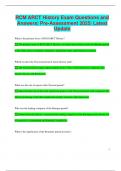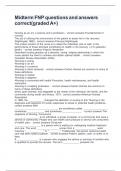RCM ARCT History Exam Questions and
Answers| Pre-Assessment 2025| Latest
Update
What is the primary focus of RCM ARCT History?
The primary focus of RCM ARCT History is to study music history from the Baroque period
to the 20th century, including composers, significant works, and historical contexts.
Which era does the Classical period of music history span?
The Classical period spans approximately from 1730 to 1820, known for composers like
Haydn, Mozart, and Beethoven.
What was the role of opera in the Classical period?
Opera became one of the most significant genres in the Classical period, with composers like
Mozart producing works that emphasized melody, structure, and expression.
Who was the leading composer of the Baroque period?
Johann Sebastian Bach is considered the leading composer of the Baroque period, known for
his mastery in counterpoint and harmonic complexity.
What is the significance of the Romantic period in music?
1
, The Romantic period (approximately 1820–1900) emphasized emotional expression,
individualism, and expanded the forms and harmonies of earlier periods, with composers like
Beethoven, Chopin, and Tchaikovsky.
What is the influence of the Impressionist movement in music?
The Impressionist movement, pioneered by composers like Claude Debussy, introduced new
scales, non-traditional forms, and an emphasis on mood and atmosphere, often inspired by visual
art.
Which composer is associated with the development of the symphonic poem?
Franz Liszt is associated with the development of the symphonic poem, a one-movement
orchestral work that expresses a narrative or idea.
What role did Beethoven play in the transition from the Classical to the Romantic period?
Beethoven played a crucial role in transitioning from the Classical to the Romantic period,
with his later works showcasing emotional depth, expanded form, and a more personal style.
Which composer was known for advancing the symphonic form during the Classical period?
Joseph Haydn is known for advancing the symphonic form during the Classical period,
establishing the structure of the symphony and string quartet.
What are some defining characteristics of the music of the Baroque period?
2
, The music of the Baroque period is characterized by ornate melodies, intricate counterpoint,
basso continuo, and the use of contrast in dynamics and texture.
Who composed "The Four Seasons," and what genre does it belong to?
Antonio Vivaldi composed "The Four Seasons," a set of violin concertos, and it is a prime
example of the Baroque concerto.
What is the role of nationalism in the music of the 19th century?
Nationalism in 19th-century music reflected composers' desire to express national identity,
often through folk melodies, rhythms, and national themes, as seen in works by composers like
Smetana, Dvořák, and Tchaikovsky.
Which composer is credited with establishing the modern orchestral tone in the 19th century?
Richard Wagner is credited with establishing the modern orchestral tone, particularly through
his use of leitmotifs and his innovative orchestration in operas like "The Ring Cycle."
What is a key feature of 20th-century music that distinguishes it from earlier periods?
A key feature of 20th-century music is its exploration of dissonance, atonality, and new
techniques such as twelve-tone rows and minimalism, with composers like Schoenberg,
Stravinsky, and Glass.
What is the significance of the "Ode to Joy" in Beethoven's Ninth Symphony?
3





